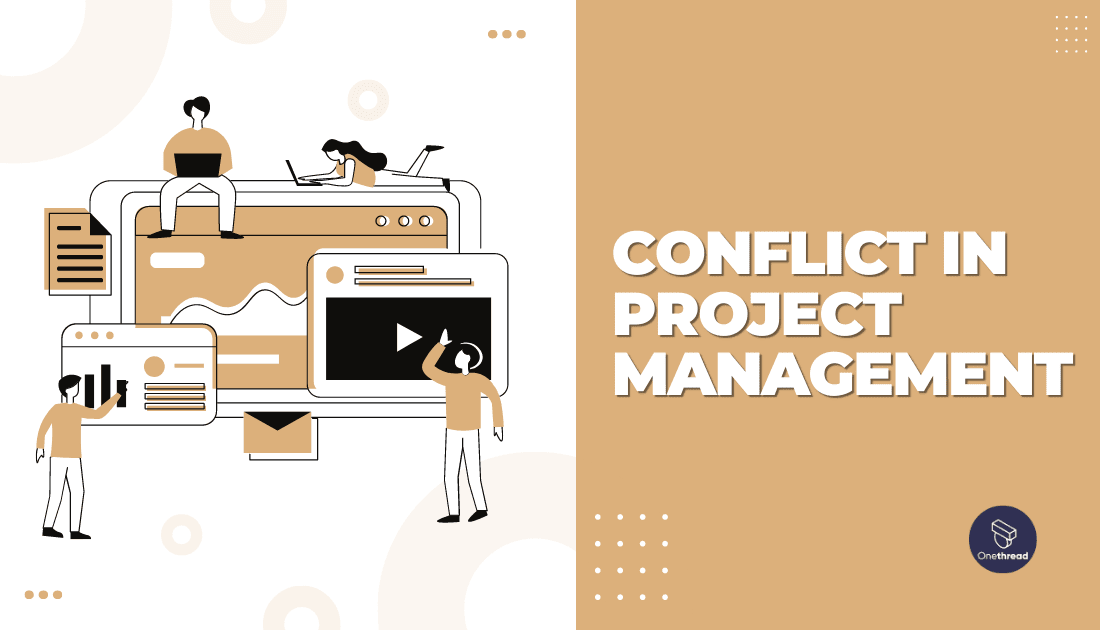In the dynamic world of project management, conflicts can emerge as formidable adversaries to success. Managing diverse teams, tight deadlines, and varying stakeholder expectations often creates a breeding ground for disagreements and clashes.
These conflicts can arise due to differences in communication styles, conflicting priorities, or even incompatible personalities. However, recognizing and effectively addressing conflicts head-on is crucial for maintaining project momentum and fostering a harmonious work environment.
This article delves into the intricacies of conflict in project management and provides valuable insights into mitigating its adverse effects.
What is Conflict in Project Management?
Conflict in project management refers to the clash or disagreement between individuals or groups involved. It arises when there is a discrepancy in goals, interests, or opinions, hindering progress and creating tension within the project team.
Conflict can manifest in various forms, such as differences in communication styles, conflicting priorities, resource allocation disputes, or power struggles.
One common cause of conflict in project management is the diversity of team members. When people from different backgrounds, cultures, or professional disciplines come together, contrasting perspectives and approaches can exist. If not effectively managed, these differences can lead to misunderstandings and conflicts.
Additionally, conflicts can arise from limited resources or conflicting project objectives. When resources are scarce, or stakeholders have conflicting interests, tensions may arise as project teams navigate these challenges. Moreover, unclear roles and responsibilities, inadequate communication, and lack of trust can contribute to conflict.
To address conflict in project management, it is essential to have a proactive approach. Clear and open communication is crucial to prevent misunderstandings and resolve conflicts early.
Active listening, empathy, and fostering a culture of respect and collaboration can help understand different viewpoints and find common ground.
Conflict resolution techniques, such as negotiation, compromise, and mediation, can be employed to find mutually agreeable solutions. It is important to involve all relevant parties in the resolution process to ensure fairness and inclusivity.
Conflict in project management can be viewed as an opportunity for growth and innovation. By embracing and actively managing conflicts, project managers can foster a positive work environment, enhance team dynamics, and drive successful project outcomes.
What are the Types of Conflict in Project Management?
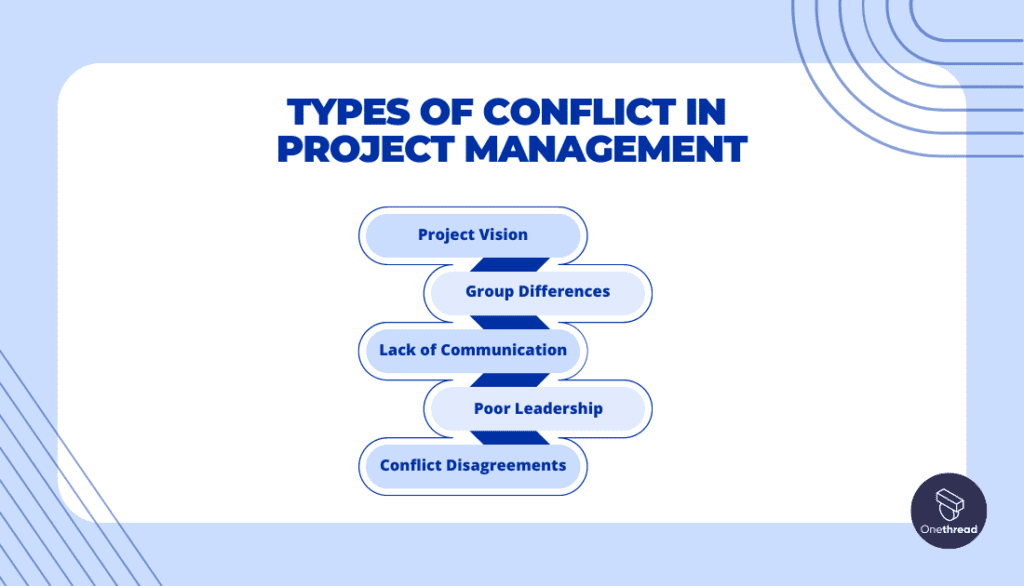
Understanding and addressing different types of conflict in project management is essential for maintaining project success, promoting teamwork, and ensuring a positive work environment.
By proactively managing conflicts, project managers can navigate challenges effectively and foster a culture of collaboration and innovation.
Project Vision
Conflicts related to project vision arise when team members interpret or understand the project’s goals and objectives differently. This can occur due to miscommunication, varying levels of stakeholder involvement, or conflicting priorities.
Resolving conflicts related to project vision requires clear communication and alignment of expectations among all stakeholders. Project managers play a crucial role in ensuring that all team members effectively communicate and understand the project vision.
Group Differences
Group differences encompass conflicts arising from diversity within the project team. Differences in cultural backgrounds, professional expertise, working styles, and personalities can contribute to misunderstandings and clashes.
Project managers must foster an inclusive and respectful environment that values diverse perspectives. Encouraging open dialogue, promoting collaboration, and facilitating team-building activities can help mitigate conflicts stemming from group differences.
Lack of Communication
Inadequate communication is a significant driver of conflicts in project management. When there is a lack of clear and timely communication, team members may make assumptions, misunderstand instructions, or feel left out, leading to frustration and conflict.
Project managers should establish effective communication channels, encourage regular updates, and ensure that information flows freely among team members. Transparent and open communication can help prevent conflicts and promote a cohesive team environment.
Poor Leadership
Poor leadership can contribute to conflicts within project management. When project managers fail to provide clear guidance, support, or effective decision-making, team members may feel demotivated, directionless, or undervalued.
This can lead to conflicts arising from power struggles, unmet expectations, or dissatisfaction. Strong leadership emphasizing fairness, empowerment, and accountability is crucial in minimizing conflicts and fostering a positive team dynamic.
Conflict Disagreements
Conflict disagreements arise due to differing opinions, perspectives, or approaches to project-related decisions. These conflicts can occur at various levels, such as task assignments, resource allocation, or strategic choices. Resolving conflict disagreements requires active listening, constructive dialogue, and a willingness to find mutually beneficial solutions.
Conflict resolution techniques such as negotiation, compromise, or consensus-building can help reach resolutions that satisfy all the involved parties.
What are the Causes of Conflicts in Project Management?
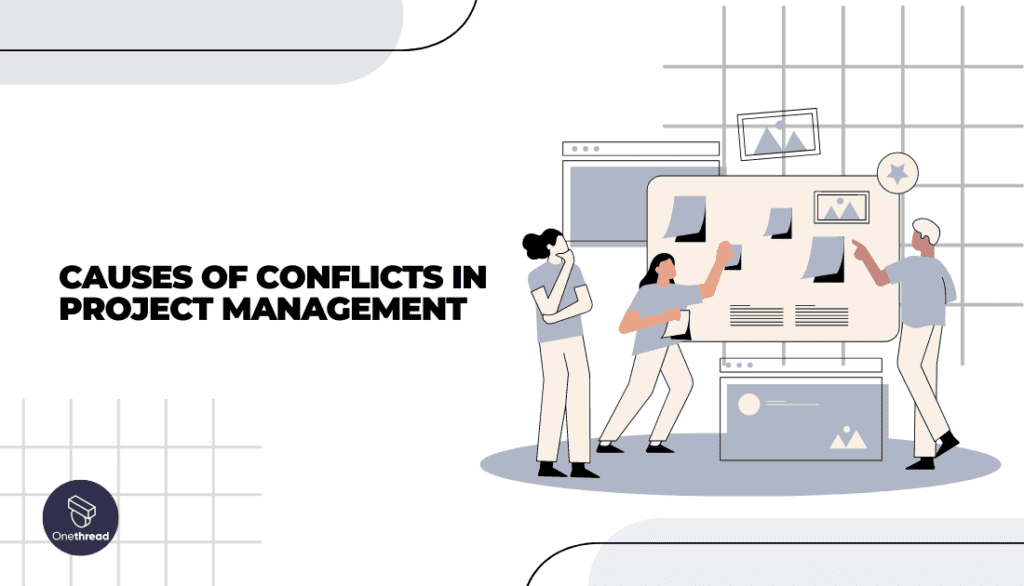
By recognizing and addressing these common causes of conflicts in project management, project managers can effectively manage and minimize conflicts, leading to improved team dynamics, successful project outcomes, and a positive work environment.
Different Stakeholder Interests
Conflicts can arise in project management when stakeholders have varying interests and priorities.
Stakeholders may have different expectations, requirements, or desired outcomes for the project, leading to conflicts over resource allocation, decision-making, or project direction. Project managers must actively engage stakeholders, clarify their interests, and seek ways to align their objectives to mitigate conflicts.
Change in Scope
Changes in project scope can often trigger conflicts. When there are alterations to project requirements, deliverables, or timelines, disagreements can emerge regarding the feasibility, impact, or necessary adjustments.
Effective change management processes, including clear communication, impact assessment, and stakeholder involvement, are crucial for minimizing conflicts arising from scope changes.
Project Management Style
Conflicts can stem from differences in project management styles and approaches. Each project manager may have preferred methods for planning, organizing, and controlling projects. Conflicts may arise when team members or stakeholders have conflicting expectations or project managers fail to adapt their style to suit the project’s needs.
Flexibility, open communication, and collaboration are key to mitigating conflicts related to project management styles.
Refuted Change Requests
Conflicts may arise when change requests are denied or rejected. Stakeholders or team members who proposed the changes may feel their suggestions are undervalued or dismissed.
Project managers should carefully evaluate change requests, provide clear explanations for refusals, and seek alternative solutions to prevent conflicts and maintain trust and transparency.
Disagreements over Communication Methods
Conflicts can occur when team members or stakeholders have different preferences for communication methods. Variances in communication styles, frequency, or channels can lead to misunderstandings, delays, or frustrations.
Project managers should establish clear communication protocols, promote active listening, and encourage open dialogue to address conflicts arising from communication differences.
Conflict Resolution
The absence of a structured conflict resolution process can exacerbate conflicts in project management. Conflicts may escalate or remain unresolved when disputes arise without a defined resolution mechanism.
Project managers should proactively anticipate potential conflicts, establish conflict resolution procedures, and train team members on effective conflict resolution techniques.
Prepare to Resolve
To effectively resolve conflicts, project managers should prepare by gathering relevant information, understanding the perspectives of all parties involved, and identifying potential solutions or compromises. Adequate preparation enables project managers to approach conflict resolution with clarity and fairness.
Understand the Situation
Understanding the underlying causes, interests, and emotions involved in a conflict is essential. Project managers should actively listen to all parties, empathize with their concerns, and seek a comprehensive understanding of the situation before proposing or facilitating a resolution.
Reach an Agreement
Successful conflict resolution entails finding common ground and reaching agreements that satisfy all parties involved. This may involve negotiation, compromise, or consensus-building.
Project managers should foster a collaborative environment that encourages constructive dialogue and facilitates resolution, ensuring the agreed-upon solutions are documented and implemented.
How to Prevent Conflicts in Project Management?
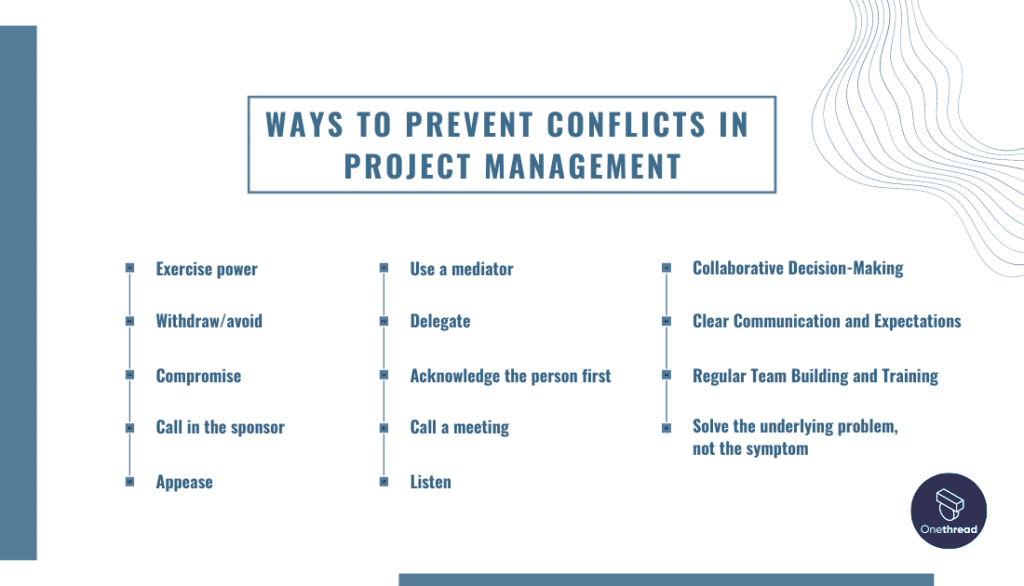
Preventing conflicts in project management is essential for maintaining a harmonious work environment and ensuring project success. Here are several strategies to consider:
Exercise power
Project managers should assert their authority when necessary to address conflicts promptly. Project managers can prevent conflicts from escalating by setting clear expectations, enforcing project guidelines, and making informed decisions.
Withdraw/avoid
In certain situations, it may be appropriate to withdraw or avoid conflicts altogether. If a disagreement is insignificant or has minimal impact on the project, project managers can let it go and focus on more critical issues.
Compromise
Encouraging a spirit of compromise can help prevent conflicts. Project managers can minimize conflicts arising from differing viewpoints or interests by finding a middle ground and seeking mutually beneficial solutions.
Call in the sponsor
In cases where conflicts become complex or difficult to resolve, involving the project sponsor can provide a fresh perspective and facilitate a resolution. The sponsor’s authority and influence can help steer conflicting parties toward agreement.
Appease
Sometimes; conflicts can arise from emotional or personal factors rather than project-related issues. Project managers can defuse such conflicts by acknowledging the emotions and concerns of the parties involved, empathizing with their viewpoints, and finding ways to appease their concerns.
Solve the underlying problem, not the symptom
Addressing conflicts at their root cause is crucial for long-term prevention. Project managers should identify and tackle the underlying issues that give rise to conflicts rather than merely addressing the immediate symptoms.
Delegate
Delegating tasks and decision-making authority to team members can reduce conflicts from micromanagement or lack of autonomy. Empowering individuals to take ownership of their responsibilities fosters a sense of trust and accountability.
Acknowledge the person first
Recognizing and valuing the individuals involved in a conflict can help defuse tensions. By acknowledging their contributions, expertise, and perspectives, project managers can create a positive atmosphere that encourages collaboration and reduces conflicts.
Call a meeting
When conflicts arise, bringing all parties together in a meeting can facilitate open dialogue, promote understanding, and foster problem-solving. The meeting should provide a safe space for individuals to express concerns and work towards a resolution.
Listen
Active listening is crucial in preventing conflicts. Project managers should attentively listen to team members and stakeholders’ perspectives, ideas, and concerns. By demonstrating empathy and understanding, conflicts can be nipped in the bud.
Use a mediator
In particularly challenging conflicts, involving a neutral third-party mediator can be beneficial. The mediator can facilitate constructive communication, guide discussions, and help parties find common ground.
Clear Communication and Expectations

Establishing clear and open lines of communication is essential in preventing conflicts. Ensure that project goals, objectives, roles, and responsibilities are effectively communicated to all team members and stakeholders.
Encourage active listening and allow individuals to seek clarification or express concerns. Regularly communicate project progress, changes, and updates to keep everyone informed and aligned.
Onethread helps in clear communication and expectations by providing a centralized platform for team members to collaborate and share information. It facilitates real-time updates, file sharing, and discussions, ensuring that everyone is on the same page, leading to better project coordination and understanding of project expectations.
Collaborative Decision-Making

Involve team members in the decision-making process to prevent conflicts stemming from feeling excluded or undervalued. Encourage collaboration and seek input from diverse perspectives.
By involving stakeholders in decision-making, you promote a sense of ownership and accountability, reducing the likelihood of conflicts arising from disagreements or resistance to imposed decisions.
Onethread enhances collaborative decision-making by providing a platform where team members can share ideas, discuss options, and reach a consensus. It enables real-time communication, fosters a transparent environment, and empowers teams to make informed decisions together, leading to more effective and well-supported choices in project management.
Regular Team Building and Training
Invest in team-building activities and training programs to foster strong interpersonal relationships, enhance communication skills, and build trust among team members. Team building activities, such as workshops, retreats, or team bonding exercises, can help individuals understand each other’s strengths, weaknesses, and working styles.
Ongoing communication, conflict management, and emotional intelligence training equip team members with the skills to prevent and navigate conflicts effectively.
Onethread aids in regular team building and training by facilitating virtual meetings and workshops. Teams can organize and participate in team-building activities and training sessions through the platform, fostering camaraderie and continuous skill development for improved project collaboration and performance.
In addition to these strategies, maintaining a positive team culture, promoting respect and collaboration, and proactively addressing potential conflicts can further contribute to conflict prevention in project management.
How to Solve the Problem if a Conflict Arises in Project Management
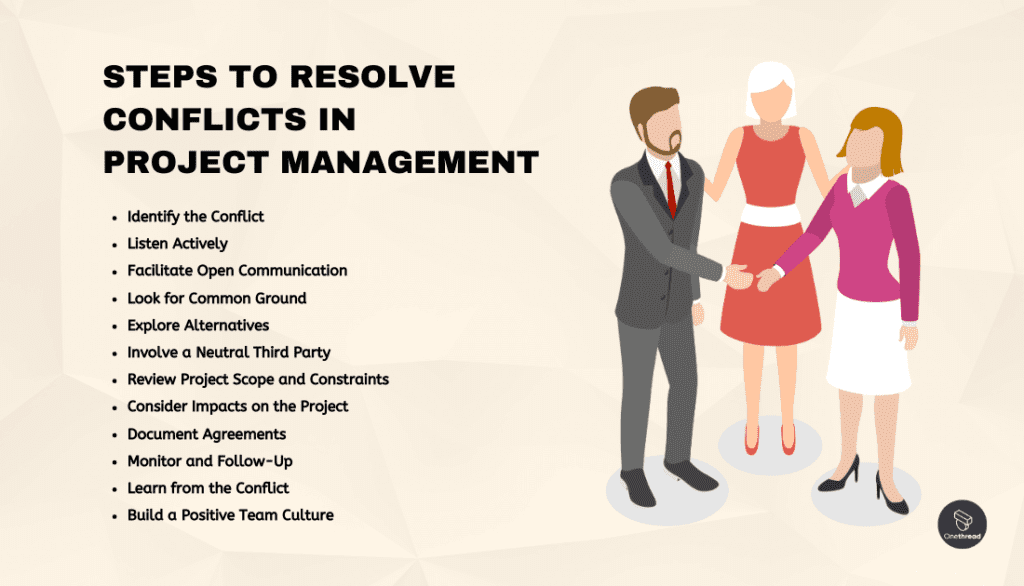
When a conflict arises in project management, it is essential to address it promptly and effectively to prevent it from escalating and negatively impacting the project. Here are steps to resolve conflicts in project management:
- Identify the Conflict: The first step is to recognize and acknowledge the conflict. Understand the nature of the disagreement, the parties involved, and the potential impact on the project.
- Listen Actively: Engage in active listening to understand the perspectives and concerns of all parties involved in the conflict. Give each person an opportunity to express their viewpoints without interruption.
- Facilitate Open Communication: Create a safe and respectful environment for open communication. Encourage all parties to express their thoughts and emotions without fear of judgment.
- Look for Common Ground: Try determining the areas of agreement and common interests among the conflicting parties. Identifying shared goals can help build a foundation for resolving the conflict.
- Explore Alternatives: Brainstorm and explore potential solutions together. Encourage creativity and open-mindedness to find mutually beneficial outcomes.
- Involve a Neutral Third Party: If the conflict persists, consider involving a neutral third party, such as a project manager, mediator, or senior stakeholder, to facilitate the resolution process.
- Review Project Scope and Constraints: Reevaluate the project scope, constraints, and expectations to ensure that the conflict is not stemming from misaligned objectives or unrealistic demands.
- Consider Impacts on the Project: Analyze the potential consequences of the conflict on the project timeline, resources, and overall success. Understanding the stakes can motivate parties to find common ground.
- Document Agreements: Once a resolution is reached, document the agreed-upon solutions, action items, and responsibilities. This ensures clarity and accountability moving forward.
- Monitor and Follow-Up: Keep track of the implemented solutions and monitor the situation to ensure the conflict does not resurface. Follow up with the parties involved to ensure ongoing cooperation.
- Learn from the Conflict: Use the conflict as an opportunity for learning and improvement. Evaluate how the conflict arose and what measures can be taken to prevent similar issues in the future.
- Build a Positive Team Culture: Foster a positive team culture that encourages open communication, collaboration, and respect among team members. A supportive environment can prevent conflicts from arising and promote a stronger team dynamic.
Final Words
Conflict in project management can be a formidable challenge, but it also presents growth and innovation opportunities. Project managers can prevent conflicts from arising or escalating by fostering open communication, setting clear expectations, and promoting collaboration.
Effective leadership, constructive conflict management, and investing in team building and training contribute to a positive work environment that minimizes conflicts.
Remember, conflicts can be addressed proactively and resolved through active listening, compromise, and finding common ground. By embracing conflicts as a natural part of project dynamics, project managers can navigate challenges and steer their teams toward success.
